Simple Steps for a Sustainable Sea
We all feel an affinity to the beautiful, unique and important coastal waters which make up the great Salish Sea. For so many of us in this region, outdoor recreation is a way of life and many coastal communities depend on the economic bounty that the Strait of Georgia specifically and the Salish Sea in general provide. We all share in the benefits of a healthy sea but we also share a responsibility to help maintain a healthy and protected marine environment.
At a time when we feel frustrated or helpless about the state of our world’s environment and the inaction of government leaders, we often ask “what can I possibly do to make a difference?” The answer, of course, is to “act locally” and start with a commitment to the very important body of water at our front door.
The Sticking up for the Salish Sea pledges provide you with simple but meaningful steps to make a positive impact on the health of our Strait. With your help, we can build a community of awareness and action. Let’s create a sustainable and vital Georgia Strait for today and for generations to come.
Click on one (or more) of the pledges below.
Download Exploring the Shoreline, Boating, Kayaking and Diving Pledges
Sticking up for the Salish Sea Pledges
Exploring the Shoreline
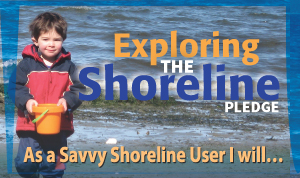 Canada has the longest coastline of any country in the world: 202,808 kilometers! It’s our responsibility to look after the parts of our coast that we use and love.
Canada has the longest coastline of any country in the world: 202,808 kilometers! It’s our responsibility to look after the parts of our coast that we use and love.
You can make a big difference, by pledging to follow these guidelines:
- Follow Marked Paths To The Beach, rather than walking across sensitive shoreline areas.
- Be Careful Of Seashore Life and avoid trampling sea-life along the shoreline.
- Leave Everything The Way I Found It, including rocks, sand, shells and sticks.
- Handle Sea-life Gently with wet hands and leave it where I found it.
- Control My Pet and dispose of its waste properly.
- Respect other recreational sea-goers.
- Report Environmental Problems to the proper authorities.
- Educate And Be A Role Model for other beach walkers.
- Get Involved in activities and issues that protect and restore marine life.
- Leave The Area As Clean Or Cleaner than I found it by disposing of my garbage properly and whenever possible cleaning up garbage that I find.
- Reconsider Having A Beach Fire. If I do, I’ll keep it small and below the high tide level.
- Help Organize Or Join A Beach Clean-up Day.
Boating
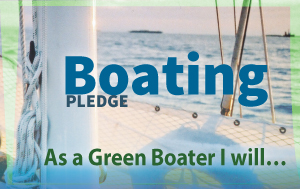 Boating is a popular pastime! With approximately 700,000 boaters in BC waters annually, minimizing environmental impacts is essential, especially in areas where boats gather such as marinas, anchorages and marine parks. This requires recreational boaters to commit to environmentally friendly practices.
Boating is a popular pastime! With approximately 700,000 boaters in BC waters annually, minimizing environmental impacts is essential, especially in areas where boats gather such as marinas, anchorages and marine parks. This requires recreational boaters to commit to environmentally friendly practices.
You can make a big difference by pledging to follow these guidelines:
- Manage Sewage Responsibly by using pump-out services, and where no pump-outs are available, only discharge as permitted by regulation (at least 3 nautical miles offshore), away from anchorages, sensitive areas, shellfish beds and swimmers.
- Use Environmentally Responsible Products for both boat maintenance and cleaning, choosing natural alternatives like vinegar and baking soda, and non-toxic, chlorine-free, phosphate-free products with EcoLogo certification when possible.
- Avoid Oil Spills When Fueling by not topping up tanks, fueling slowly to prevent kickback, and using oil absorbent pads and fuel collars to prevent any fuel from entering the water.
- Use Bilge Filters Or Bilge Pads to absorb oil and fuel that collects in my boat’s bilge area, preventing contaminated water from being pumped overboard accidentally.
- Choose Eco-Friendly Bottom Paint and Practices by selecting hard, non-fouling, or silicone-based biocide-free paints over copper-based options, buying only what I need and resealing for future use.
- Haul Out at Responsible Boat Yards with containment policies and equipment to prevent sandings and scrapings from entering the water, such as those certified by Clean Marine BC, and use drop cloths to collect all residue while doing maintenance on land.
- Dispose of All Wastes Properly by never discharging anything overboard, using proper disposal facilities for hazardous materials like oil, fuel, antifreeze, paints, and batteries, and recycling waste boating materials when possible.
- Follow Wildlife and Marine Mammal Distance Regulations by maintaining 400 metres from killer whales in Southern BC waters (Campbell River-Ucluelet), 200 metres from killer whales elsewhere in BC, 200 metres from whales, porpoises or dolphins at rest/with calves and large whales like humpbacks (collision risk), 100 metres from other marine mammals and bird colonies, and slowing down near wildlife to minimize wake and noise.
- Watch for Whales and Respond Appropriately by recognizing and using yellow, red and black whale warning flags that indicate whales are in the area, reducing my speed when whales are nearby, following proper distance regulations, and turning my engine off or putting it in neutral at idle speed if whales approach, allowing them to pass safely.
- Protect Sensitive Marine Habitat by anchoring in depths greater than 8 metres (25 feet) to avoid damaging eelgrass beds, respecting voluntary no-anchor zones marked by buoys, and avoiding running engines near eelgrass and kelp beds.
- Prevent the Spread of Invasive Species by following Clean, Drain, Dry protocols between waterbodies, removing all visible debris, and pulling drain plugs during transport (required by law in BC since May 2024).
- Help Other Boaters Become Aware by role-modeling these practices and sharing knowledge about environmental protection.
- Follow Sound Practices and Principles as outlined in the Georgia Strait Alliance’s Guide to Clean Boating and support Clean Marine BC Certified marinas and boating facilities with responsible environmental policies.
Kayaking
 BC’s outdoor tourism industry is growing quickly, and paddling has never been so popular! But even by having fun, we can put a lot of pressure on marine habitat and wildlife.
BC’s outdoor tourism industry is growing quickly, and paddling has never been so popular! But even by having fun, we can put a lot of pressure on marine habitat and wildlife.
You can make a big difference, by pledging to follow these guidelines:
- Be Careful Of Seashore Life When Entering And Leaving The Water and avoid trampling sea-life along the shoreline.
- Maintain Distance From Wildlife and their resting places; keep 100m from marine mammals, including whales, as well as bird colonies and seal haul–outs.
- Avoid Directly Approaching Wildlife and paddle when it least disturbs them. I will retreat from an area by back paddling if wildlife appears disturbed.
- Avoid Touching Marine Animals, as there are a variety of ways I can unintentionally hurt them.
- Not Attempt To Rescue Wildlife that appears abandoned or injured.
- Use Shore Toilet Facilities Whenever Possible. Otherwise I will urinate below the high tide line and defecate in a 15-20cm deep hole at least 60m (about 70 adult steps) away from any water source and the shore whenever possible.
- Keep My Garbage Contained, including toilet paper and sanitary products, and take it home with me.
- Have A Valid Fishing License and keep up to date on closures.
- Respect Other Paddlers and all users of the water.
- Report Environmental Problems to the proper authorities.
- Get Involved In Activities That Protect Marine Life and support Marine Conservation Groups.
- Follow Sound Practices And Principles as outlined in the Guide to Green Boating.
Diving
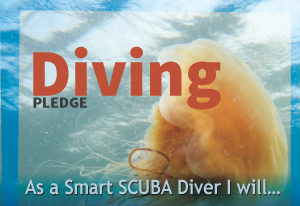 Much of what is so special about the 10,400 square kilometer Georgia Strait is hidden below the water. As divers and water enthusiasts, we’re responsible for the future health of the underwater environment.
Much of what is so special about the 10,400 square kilometer Georgia Strait is hidden below the water. As divers and water enthusiasts, we’re responsible for the future health of the underwater environment.
You can make a big difference, by pledging to follow these guidelines:
- Stay Informed About the Marine Life and Fragile Ecosystems In My Dive Areas and respect all creatures during my dive.
- Ensure All My Equipment Is Well Secured to prevent injury to marine life and habitat.
- Keep My Diving Skills Sharp with continuing education and by practicing good buoyancy; finning and body control; and backwards swimming techniques to avoid unnecessary contact with the underwater world.
- Avoid Stirring Up Sand Or Silt so as to not cover up marine life.
- Dispose Of Garbage Properly at my dive sites and whenever possible collect recent garbage during my dives.
- Resist The Urge To Collect Souvenirs.
- Stay Informed About The Latest Fish And Game Regulations and obey all associated laws.
- Report Any Environmental Disturbances Or Destruction of my dive sites.
- Be A Role Model for other divers in diving and non-diving interaction with the environment.
- Get Involved In Activities That Protect Marine Life and support Marine Conservation Groups.
Fishing
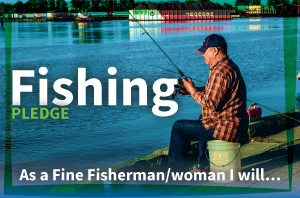 With more and more people fishing, fewer fish in the ocean and about 30 threatened or endangered fish species in our region, we need to make sure our fishing is sustainable.
With more and more people fishing, fewer fish in the ocean and about 30 threatened or endangered fish species in our region, we need to make sure our fishing is sustainable.
You can make a big difference, by pledging to follow these guidelines:
- Fish With the Future in Mind, by keeping only what fish I need.
- Use Proper Catch and Release Methods for fish not kept.
- Follow All Fishing, Boating and Environmental Regulations.
- Dispose of All Garbage Properly including the notorious old fishing line, plastic bait bags and six-pack rings.
- Fish Only for Species that are Abundant and avoid species that are over-fished or poorly managed.
- Be Aware of and Respect Rockfish Conservation Areas.
- Avoid Spilling Pollutants like gas, oil and antifreeze into the water.
- Support the Creation of More Marine Protected Areas that will provide important refuges and breeding zones for fish.
- Avoid Fishing in Marine Parks.
- Help Educate other anglers to fish sustainably.
Bird Watching
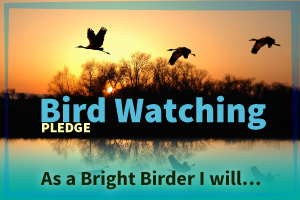 Our region supports millions of birds from three continents and more than 20 countries! Migrating birds rely on marshes, eelgrass beds, mudflats, beaches and flooded meadows in our region for their survival. It’s important that we keep these places healthy.
Our region supports millions of birds from three continents and more than 20 countries! Migrating birds rely on marshes, eelgrass beds, mudflats, beaches and flooded meadows in our region for their survival. It’s important that we keep these places healthy.
You can make a big difference by pledging to follow these guidelines:
- Observe and Photograph Birds Without Knowingly Disturbing Them in any significant way. I will avoid chasing or repeatedly flushing birds.
- Only Sparingly Use Recordings and Similar Methods of Attracting Birds and not use these methods in heavily birded areas.
- Keep an Appropriate Distance From Nests and Nesting Colonies so as not to disturb the birds or expose them to danger.
- Refrain From Handling Birds or Eggs unless engaged in recognized research activities.
- Stay on Existing Roads, Trails and Pathways whenever possible to avoid trampling or otherwise disturbing the fragile habitat.
- Leave All Habitats as They Were Found.
- Observe All Laws and the Rules and Regulations that govern public use of birding areas.
- Limit Groups to a size that does not threaten the environment.
- Teach Others birding ethics by my words and example.
- Follow the American Birding Association’s Code Of Birding Ethics (from which our guidelines were adapted)
Whale & Wildlife Watching
 Around 9 million people live around the Salish Sea, and most of us love to see wildlife. But there are only 73 Southern Resident orcas left in our region, so we must make sure the activities we love aren’t harming these whales or other marine wildlife.
Around 9 million people live around the Salish Sea, and most of us love to see wildlife. But there are only 73 Southern Resident orcas left in our region, so we must make sure the activities we love aren’t harming these whales or other marine wildlife.
You can make a big difference, by pledging to follow these guidelines:
- Be Cautious and Courteous and approach areas of known or suspected marine mammal activity with extreme caution. I will look in all directions before planning my approach or departure.
- Watch orcas from the shore, as land-based whale watching is the best and safest way to experience the majesty or orcas and other marine life.
- Slow Down and reduce speed to less then 7 knots when within 400 metres/yards the nearest whale/dolphin/sea lion. I will avoid abrupt course changes. Ideally I will keep a distance of 1,000 metres, and not get closer than I should.
- Slow Down When Approaching Commercial Whale Watching Boats that are stopped or going slowly, even if I cannot see any wildlife.
- Avoid Approaching Closer Than 100 metres/yards to any marine mammals or birds.
- Stop Immediately and Allow the Whales to Pass if my vessel is unexpectedly within 400 metres/yards of a whale.
- Avoid Approaching Whales From Behind. I will always approach and depart whales from the side, moving in a direction parallel to the direction of the whales.
- Keep Clear of the Whales’ Path. I will avoid positioning my vessel within the 400-metre/yard area in the path of the whales.
- Stay on the Offshore Side of the Whales when they are traveling close to shore and remain at least 200 metres/yards offshore at all times.
- Limit My Viewing Time to a recommended maximum of 30 minutes so as to minimize the cumulative impact of many vessels and give consideration to other viewers.
- Be Quiet and Cautious when around haul-outs and bird colonies.
- Pay Attention and back away at the first sign of disturbance or agitation.
- Not Swim With, Touch or Feed whales or other marine mammals.
Waterfront Living
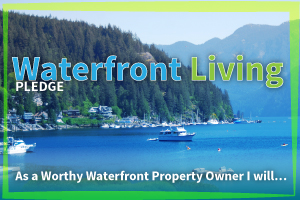 Almost three quarters of BC’s population lives around the Strait of Georgia. Those lucky enough to be waterfront property owners are on the front line for healthy interactions between land and water!
Almost three quarters of BC’s population lives around the Strait of Georgia. Those lucky enough to be waterfront property owners are on the front line for healthy interactions between land and water!
You can make a big difference, by pledging to follow these guidelines:
- Soften My Shoreline with native trees, shrubs, grasses and beach logs, so as to improve protection against erosion.
- Resist the Urge to “Tidy Up”, and instead, let organic debris like beach logs and fallen trees act as a natural sea wall.
- Landscape With Low Maintenance Native Plants, mow lawns high with a mulching mower, and compost kitchen and garden waste.
- Prune Trees Rather Than Removing Them, and plant native trees and shrubs to reduce erosion and runoff.
- Use Environmentally Friendly Products and Cleaners, or home-made non-toxic alternatives like baking soda and vinegar.
- Dispose of Used Oil and Other Pollutants Properly.
- Repair and Maintain my Septic System.
- Repair Solid Surfaces with porous materials and redirect gutter runoff into porous or vegetated areas, away from shore.
- Share Beach Access with my neighbours, and where possible, maintain a narrow winding trail so as to avoid accessing steep banks.
- Use Public Docks and Boat Launches, and/or consider replacing my dock with a low impact access option (e.g. a mooring buoy).
- Use a Well Maintained Lawn Mower and a 4-stroke outboard motor or fuel-injected 2-stroke.
